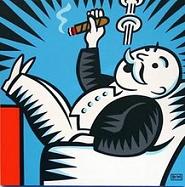Billionaires Gain as Living Standards Fall

The world’s 100 richest people added $241 billion to their combined wealth in 2012, according to the Bloomberg Billionaires Index. The top 100 controlled an aggregate $1.9 trillion as calculated by the prices on world stock markets December 31, for an average of nearly $20 billion apiece.
If the top 100 were a separate state, their combined wealth would outstrip the Gross Domestic Product of all but eight countries. They would rank behind Italy, but ahead of India and Russia. Of course, being billionaire capitalists, the top 100 don’t actually produce anything. They own, and they reap the benefits of the labor of others.
The main driver in the increasing wealth of the super-rich was the rise in global stocks, up 13.2 percent worldwide, as measured by the MSCI World Index; up 13.4 percent in the US, as measured by the S&P 500. The Stoxx Europe 600 index is up 19.6 percent since June, when investors judged that the Greek debt crisis would not bring about the immediate collapse of the eurozone.
The United States accounted for nine of the top 12 billionaires and 37 of the top 100, with the combined holdings of American multibillionaires comprising half the total. Europe including Russia followed with 34, while Asia accounted for 14 and Latin America for 11.
The biggest single gainer among the top 100 was Amancio Ortega of Spain, the 76-year-old founder of the Inditex SA retailer, operator of the Zara clothing chain, whose fortune rose from $35.3 billion to $57.5 billion. This vaulted him into third place in the global index, passing American investor Warren Buffett, and trailing only the two who have headed the index for many years: Mexican banking, telecommunications and media mogul Carlos Slim, and Microsoft chief Bill Gates.
Ortega was part of a trend, as retail proprietors among the billionaires showed the biggest gains for the year, up 20 percent. Other retailers include IKEA founder Ingvar Kamprad, 86, the world’s fifth-richest man, at $42.9 billion; Jeff Bezos of Amazon.com; and the four direct heirs of Sam Walton, the founder of Wal-Mart.
This increase was all the more remarkable since consumer spending has essentially stagnated since the 2008 Wall Street crash. The retail bosses are increasing their fortunes not so much because sales are rising, as because their smaller competitors are being ruined by the crisis, giving the biggest companies monopoly profits. Bezos, for example, added $6.9 billion to his net worth in 2012, in the wake of the collapse of rival Borders, which led to the elimination of 20,000 jobs.
The divergence between the rising fortunes of the billionaires and the declining living standards of the masses is an essential feature of global capitalism. Nowhere is the contrast starker than in Spain, where Senor Ortega, the founder of Inditex and its 1,600 Zara stores, increased his fortune by $22.2 billion in the course of 2012.
The capitalist crisis has brought disaster for Spanish working people. Household wealth has fallen by 8 percent on average, second only to depression-ravaged Greece among European countries, while both overall unemployment and youth unemployment set records at 26.6 percent and 56.5 percent, respectively. The right-wing government headed by Prime Minister Mariano Rajoy has announced a series of massive cuts in public spending, devastating public education and other essential services.
But while the Spanish working class suffers through the worst economic conditions since the Great Depression, one Spanish billionaire possesses a personal fortune greater than the total amount of the cuts announced by the Rajoy government. At $57.5 billion, Ortega’s wealth would have allowed him to carry out last month’s $52 billion bailout of the Spanish banking system, which effectively wrecked Spain’s national budget, and have billions left over.
In recent months, Spain has been the scene of social tragedies unheard of since the depths of Franco fascism, including suicides by victims of foreclosure, and unemployed workers and the elderly picking through garbage dumps for food.
When in the human body a small group of cells begins to multiply and grow without limit, at the expense of other cells and the organism as a whole, medical science has a specific term for the phenomenon: it is called a cancer. In the social organism of 21st century capitalism, the super-rich play that fundamentally pernicious and destructive role.
In the sphere of health care, the prescribed response is to destroy the cancer through a variety of treatments, in order to save the human being. In capitalist society, however, the growth of the super-rich is hailed as the source of all progress, the social cancer is dubbed the “job creator” and the entire political system bows down before it.

